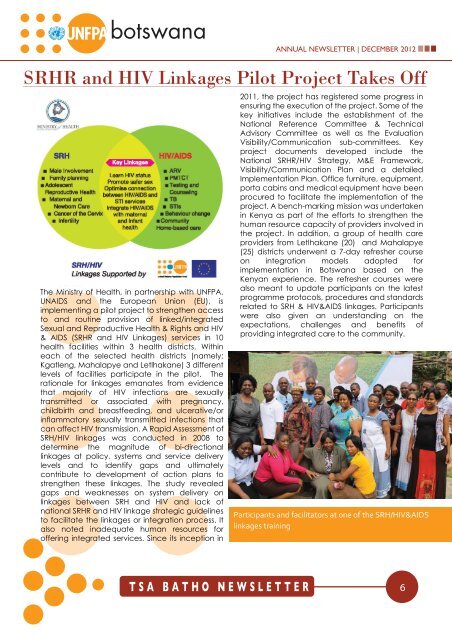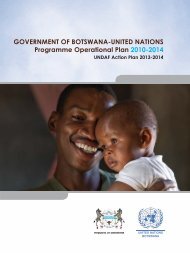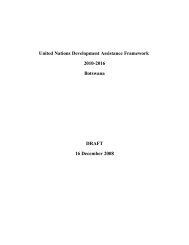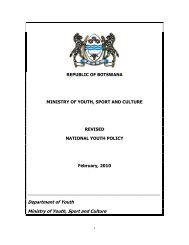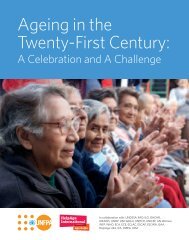English - UNFPA Botswana
English - UNFPA Botswana
English - UNFPA Botswana
Create successful ePaper yourself
Turn your PDF publications into a flip-book with our unique Google optimized e-Paper software.
The Ministry of Health, in partnership with <strong>UNFPA</strong>,<br />
UNAIDS and the European Union (EU), is<br />
implementing a pilot project to strengthen access<br />
to and routine provision of linked/integrated<br />
Sexual and Reproductive Health & Rights and HIV<br />
& AIDS (SRHR and HIV Linkages) services in 10<br />
health facilities within 3 health districts. Within<br />
each of the selected health districts (namely;<br />
Kgatleng, Mahalapye and Letlhakane) 3 different<br />
levels of facilities participate in the pilot. The<br />
rationale for linkages emanates from evidence<br />
that majority of HIV infections are sexually<br />
transmitted or associated with pregnancy,<br />
childbirth and breastfeeding, and ulcerative/or<br />
inflammatory sexually transmitted infections that<br />
can affect HIV transmission. A Rapid Assessment of<br />
SRH/HIV linkages was conducted in 2008 to<br />
determine the magnitude of bi-directional<br />
linkages at policy, systems and service delivery<br />
levels and to identify gaps and ultimately<br />
contribute to development of action plans to<br />
strengthen these linkages. The study revealed<br />
gaps and weaknesses on system delivery on<br />
linkages between SRH and HIV and lack of<br />
national SRHR and HIV linkage strategic guidelines<br />
to facilitate the linkages or integration process. It<br />
also noted inadequate human resources for<br />
offering integrated services. Since its inception in<br />
2011, the project has registered some progress in<br />
ensuring the execution of the project. Some of the<br />
key initiatives include the establishment of the<br />
National Reference Committee & Technical<br />
Advisory Committee as well as the Evaluation<br />
Visibility/Communication sub-committees. Key<br />
project documents developed include the<br />
National SRHR/HIV Strategy, M&E Framework,<br />
Visibility/Communication Plan and a detailed<br />
Implementation Plan. Office furniture, equipment,<br />
porta cabins and medical equipment have been<br />
procured to facilitate the implementation of the<br />
project. A bench-marking mission was undertaken<br />
in Kenya as part of the efforts to strengthen the<br />
human resource capacity of providers involved in<br />
the project. In addition, a group of health care<br />
providers from Letlhakane (20) and Mahalapye<br />
(25) districts underwent a 7-day refresher course<br />
on integration models adopted for<br />
implementation in <strong>Botswana</strong> based on the<br />
Kenyan experience. The refresher courses were<br />
also meant to update participants on the latest<br />
programme protocols, procedures and standards<br />
related to SRH & HIV&AIDS linkages. Participants<br />
were also given an understanding on the<br />
expectations, challenges and benefits of<br />
providing integrated care to the community.<br />
Participants and facilitators at one of the SRH/HIV&AIDS<br />
linkages training<br />
6


